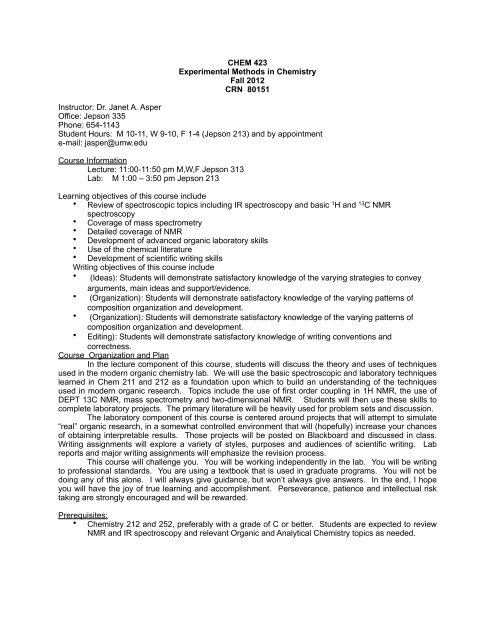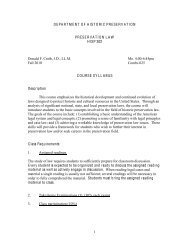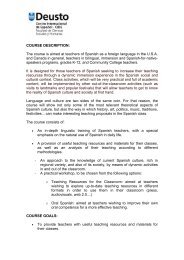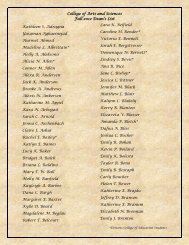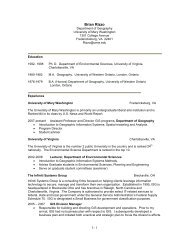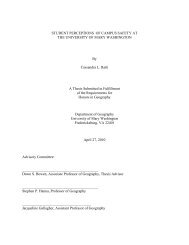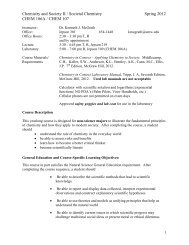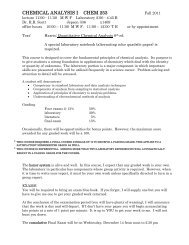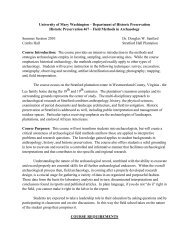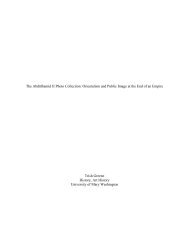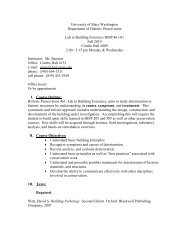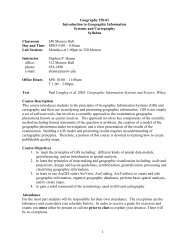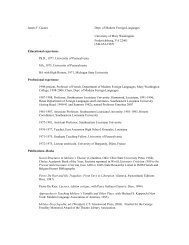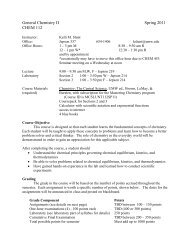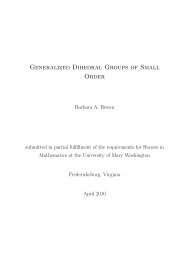CHEM 423 Syllabus Fall 2012
CHEM 423 Syllabus Fall 2012
CHEM 423 Syllabus Fall 2012
You also want an ePaper? Increase the reach of your titles
YUMPU automatically turns print PDFs into web optimized ePapers that Google loves.
<strong>CHEM</strong> <strong>423</strong>Experimental Methods in Chemistry<strong>Fall</strong> <strong>2012</strong>CRN 80151Instructor: Dr. Janet A. AsperOffice: Jepson 335Phone: 654-1143Student Hours: M 10-11, W 9-10, F 1-4 (Jepson 213) and by appointmente-mail: jasper@umw.eduCourse InformationLecture: 11:00-11:50 pm M,W,F Jepson 313Lab: M 1:00 – 3:50 pm Jepson 213Learning objectives of this course include• Review of spectroscopic topics including IR spectroscopy and basic 1 H and 13 C NMRspectroscopy• Coverage of mass spectrometry• Detailed coverage of NMR• Development of advanced organic laboratory skills• Use of the chemical literature• Development of scientific writing skillsWriting objectives of this course include• (Ideas): Students will demonstrate satisfactory knowledge of the varying strategies to conveyarguments, main ideas and support/evidence.• (Organization): Students will demonstrate satisfactory knowledge of the varying patterns ofcomposition organization and development.• (Organization): Students will demonstrate satisfactory knowledge of the varying patterns ofcomposition organization and development.• Editing): Students will demonstrate satisfactory knowledge of writing conventions andcorrectness.Course Organization and PlanIn the lecture component of this course, students will discuss the theory and uses of techniquesused in the modern organic chemistry lab. We will use the basic spectroscopic and laboratory techniqueslearned in Chem 211 and 212 as a foundation upon which to build an understanding of the techniquesused in modern organic research. Topics include the use of first order coupling in 1H NMR, the use ofDEPT 13C NMR, mass spectrometry and two-dimensional NMR. Students will then use these skills tocomplete laboratory projects. The primary literature will be heavily used for problem sets and discussion.The laboratory component of this course is centered around projects that will attempt to simulate“real” organic research, in a somewhat controlled environment that will (hopefully) increase your chancesof obtaining interpretable results. Those projects will be posted on Blackboard and discussed in class.Writing assignments will explore a variety of styles, purposes and audiences of scientific writing. Labreports and major writing assignments will emphasize the revision process.This course will challenge you. You will be working independently in the lab. You will be writingto professional standards. You are using a textbook that is used in graduate programs. You will not bedoing any of this alone. I will always give guidance, but won’t always give answers. In the end, I hopeyou will have the joy of true learning and accomplishment. Perseverance, patience and intellectual risktaking are strongly encouraged and will be rewarded.Prerequisites:• Chemistry 212 and 252, preferably with a grade of C or better. Students are expected to reviewNMR and IR spectroscopy and relevant Organic and Analytical Chemistry topics as needed.
Textbooks and SuppliesRequired:• Pavia, D.L.; Lampman, G.M.; Kriz, G.S.; Vyvyan, J.R. Introduction toSpectroscopy .Fourth Edition. Brooks Cole, Belmont, CA. 2009. (ISBN 0-495-11478-2)• Hofman, A.H. Scientific Writing and Communication. Oxford University Press, New York,NY. 2010 (ISBN 978-0-19-539005-6)• Department approved lab coat, goggles• Duplicating Laboratory Notebook• Closed toe shoes• Eagle One card with money for printing or access to a printer• Sharpie MarkerRecommended and on reserve in the library:•Mohrig, J.R.; Hammond, C.N.; Schatz, P.F. Techniques in Organic Chemistry, SecondEdition. W.H. Freeman and Co, New York, NY. 2006. (ISBN 0-7167-6935-2)•Access to an organic textbook.Course PoliciesAttendance: This course will make extensive use of the lecture sessions for individual and group problemsets and discussions of laboratory data. Attendance at these sessions will be critical. Some of theseactivities will be graded and may not be able to be replicated or “made up” outside of class.The afternoon laboratory session will be dedicated to students’ individual work on their three independentprojects. Attendance at these sessions is mandatory for the entire laboratory period. If a student mustmiss a laboratory session, they must notify Dr. Asper by phone or e-mail before the class session begins.Any make-ups will be at the instructor’s discretion.Students may find it necessary to return to the laboratory outside of the scheduled class time to useinstruments and complete laboratory work. The times available and safety policies will be outlined on thefirst day of class. Students must work within those times, in proper laboratory attire, and with a buddy.Students who do not follow those safety guidelines may be required to meet with the safety officer andmay be removed from the class.Electronic Devices: Cell phones and PDAs are not to be used in class or in lab. They should be turnedoff during class sessions. Laptops shouldn’t be necessary during lecture. If you choose to use one,please do not distract yourself or your classmates with e-mail, chatting, websurfing etc. Laptops won’t beneeded in lab. Please make sure they are stored away from your work area so they are not damaged byreagents or solvents. Headphones are not to be work in the lab or instrument rooms at any time. Cellphones, PDAs and other electronic devices are not allowed during exams. A calculator may be used, butit must not contain any chemical information that could be used during an exam.CommunicationI will make use Canvas to communicate with you regularly. Make sure that you know how to use Canvasand set up the needed alerts. Please keep your UMW mailboxes empty enough that you can receive anye-mails and keep this line of communication open.Academic Dishonesty: The honor system, as outlined on the UMW Fredericksburg Honor CouncilWebsite will be strictly enforced in this course. Students are reminded of their obligation to abide by thecode, including reporting observed violations to the Honor Council. The honor pledge will be written on allgraded work. Books, notes, cell phones, PDAs and other electronic devices are not allowed duringexams. A calculator may be used, but it must not contain any chemical information that could be usedduring an exam. All written work is to be prepared “in your own words”. Guidelines for source use mustbe followed.http://www.umw.edu/honor/fredericksburg/default.phpADA: Students requiring accommodation for disabilities must discuss their needs with the Director ofDisability Services (654-1266), and provide appropriate documentation. In order for me to best meet yourneed, I must receive documentation and discuss your needs by September 5, 201. I will hold any
information you share with me in the strictest confidence unless you give me permission to do otherwise.The University’s disability policy is outlined at http://www.umw.edu/disability/.GradingThis course will be graded on a straight scale of 1200 points as follows.Exams (3 at 100 pts each) 300Lab reports (3 at 150pts each) 450Problem sets and short writing assignments 150Lab Notebooks 100Final exam 200Total 12001080-1200 A/A-960-1079 B-/B/B+840-959 C-/C/C+720-839 D0-719 FStudents with a course average of C or less will receive a midsemester report.Exams will cover assigned reading, lecture topics, class discussions, problem sets and relevantlaboratory techniques. The exact format of each exam will be posted on Blackboard before each exam.Any student who must miss an exam must contact Dr. Asper before the exam begins. Make-up examswill be give at Dr. Asper’s discretion, will be different exams and may be a different format than the examthat the rest of the class takes.Lab Reports will be prepared for each of the projects that students will complete over the course of thesemester. These comprehensive lab reports will be prepared according to the ACS Style guide, usingappropriate software (Word, Excel, ChemDraw). Each report grade will be based on preliminary drafts,peer editing and final reports. Directions for preparing each report, due dates and grading rubrics are inyour course pack. Late lab reports will be penalized 10% per day.Quizzes, Problem sets and Writing Assignments: include in class quizzes, chemical literature exercises,short writing assignments and spectroscopy problem sets. Some sets will be prepared individually, othersas group projects. Guidelines for each project will be announced with each set. Late assignments willnot be accepted.Lab Notebooks: Each student will record all of their laboratory data in a duplicating lab notebook (sold atthe bookstore). Every Wednesday morning, at the beginning of class, students will turn in the duplicatepages for all laboratory work completed in and out of class for that week. The weekly notebook grade willinclude scores for technique, efficient use of laboratory resources and laboratory preparation. Guidelinesfor the preparation of your notebook and sample grading rubric will be outlined in lab and posted onCanvas.Final Exam: The final exam is a comprehensive exam worth 200 points. It is University policy thatmissing a final exam will result in a grade of F for the course. A review sheet and further information willbe provided. The final exam for this course will be held on Monday December 10 from noon to 2:30 pmAND Thursday Friday December 14 from noon to 2:30 pm.
Chem <strong>423</strong> Tentative Schedule <strong>Fall</strong> <strong>2012</strong>MondayMondayLABWednesdayFridayAug 27IntroIntro, Notebooks,Inst. Training 129Ch 131Ch 1Sept 3Ch 810Ch 817Ch 224Exam 1Oct 1Ch 3 and 68Ch 3 and 615<strong>Fall</strong>22Ch 429Ch 55Ch 512Ch 6.8-1119Ch 926Ch 93Ch 10Inst. Training 2 5Ch 8Project 1 12Ch 8Project 1 19Ch 2Project 1 26Ch 3 and 6Project 1 3Ch 3 and 6Project 2 10Ch 3 and 6Break 17Ch 4Project 2 24Ch 4Project 2 31Ch 5Project 2 7Ch 5Project 3 14Ch 6.8-11Project 3 21ThanksgivingProject 3 28Ch 9Project 3 5Ch 107Ch 814Ch 821Ch 228Ch 3 and 65Ch 3 and 612Exam 219Ch 426Ch 4Nov 1Ch 59Ch 516EXAM 323Break30Ch 97Ch 10The final exam for this course will be held on Monday December 10 from noon to 2:30 pm ANDThursday Friday December 14 from noon to 2:30 pm.


